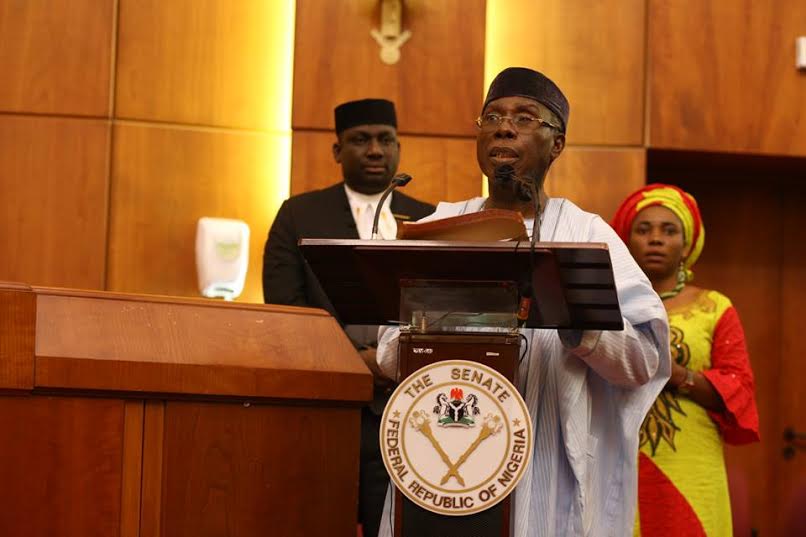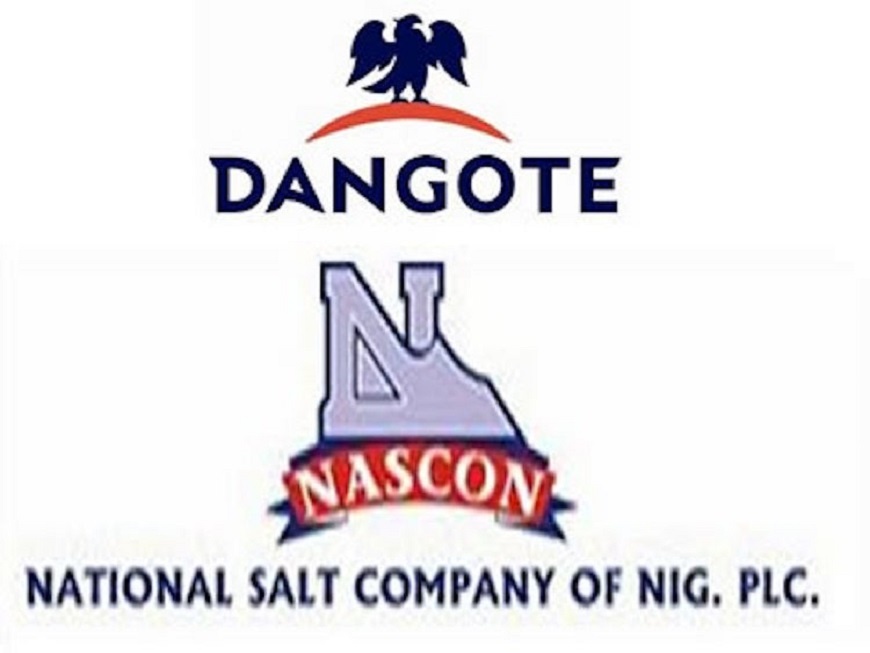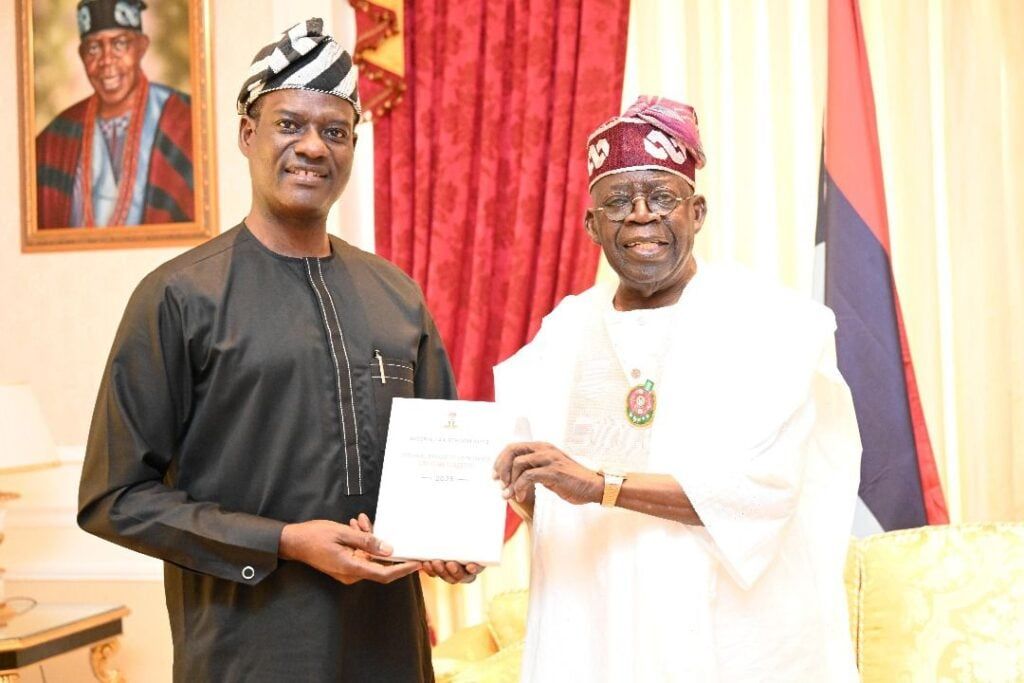Economy
FG Tasks Agric Varsities on Food Security to Earn Income

By Modupe Gbadeyanka
The three federal universities of agriculture in Nigeria have been charged to “scale- up plantations” over time in order to “earn income.”
This charge was given last Tuesday in Abuja by the Minister of Agriculture and Rural Development, Mr Audu Ogbeh, when he received members of the governing councils of federal universities of agriculture.
Mr Ogbeh noted that it was important for the institutions to be the “food basket” of their “respective host communities.”
While commending the initiative of the schools in Abeokuta and Umudike on this subject matter, the Minister said, “You have huge parcels of land averaging 10,000 ha each. I enjoin you to put them to use.”
He pointed out that “as institutions of agricultural education and research, you can earn huge revenues from agricultural research, seed and seedling development, extension work, soil mapping and even production of food on campus.”
Mr Ogbeh advised the universities to give greater priority to courses with agriculture-related content.
“We do not forbid the teaching of electives like some accounting, business administration and so on, but only as subsidiaries. The main courses must be agriculture, agronomy, botany, animal husbandry, forestry, fishery, plant entomology, breeding, cattle breed improvement, Agric engineering, veterinary medicine,” he insisted.
He further advised that the schools “should be training graduates who should be going straight into production, with credit support from their alma-mater, produce chicken, eggs, goats, milk, set up meat laboratories, bake bread and above all produce and sell large quantities of high quality hybrid seeds.
“Farmers are in desperate need of these services and more. You will make huge profits from innovative agricultural practice.”
The Minister assured lecturers and students engaged in non-agricultural studies in the three universities of agriculture that their careers will not be jeopardized.
According to Mr Ogbeh, “The return of the three universities of agriculture to this Ministry is a rational, just and timely action, necessitated by the new economic realities we are in, to ensure that our institutions are better focused and more efficiently and economically managed.”
The three federal universities of agriculture, he noted, “were established to advance the cause of agricultural transformation and modernization in Nigeria for the development of core competencies in agricultural education, research and training, amongst others.
“It is therefore, expected that the admission policy of these universities will largely be reflective of this overarching goal.
“Our submission is that, in the long run, the universities will be better served if they focus on their core areas of business rather than on the subsidiaries.”
He expressed the consciousness of government on the “fears and anxieties of teachers and the students already enrolled for these subsidiary programmes.”
Accordingly, he said, “we will not be cancelling them immediately. The task before you is to phase them out gradually.”
He assured the universities that there will be “an important and strategic modification” to the existing faculties of medicine.
“The faculties will now be called Colleges of Nutrition and Medical Sciences.”
If attention is paid to the increasing awareness on the importance of nutrition, he said, “we may not only be drastically reducing our national health bill, but also raising the bar of our currently low life expectancy average.”
The Minister disclosed that “the Federal Ministry of Agriculture and Rural Development has already set in motion a machinery to remodel the three universities under our joint care with a view to transforming them into centres of excellence of global reckoning. In this connection, we shall ensure that the institutional structures already enshrined in the Federal Universities of Agriculture Act cap F22 CFN 2010 for their effective management are put in place without delay.”
Economy
Nigeria in Talks with China to Expand Yuan–Naira Swap Deal to $10bn

By Adedapo Adesanya
The federal government is in advanced talks with China to expand its existing Yuan–Naira currency swap to as much as $10 billion, a move aimed at easing pressure on the US dollar and narrowing the trade imbalance that heavily favours the Asian country.
The director general and Global Liaison for the Nigeria–China Strategic Partnership (NSCP), Mr Joseph Tegbe, said in Abuja that the government was seeking to renew and scale up the current $2.5 billion swap arrangement to allow businesses transact directly in yuan, reducing reliance on the dollar for bilateral trade.
According to him, the existing swap line, though initially underutilised, is being renewed and expanded, with proposals to increase it to $10 billion.
Mr Tegbe said Nigeria was also fast-tracking export protocols to take full advantage of China’s zero-tariff policy for African countries, set to take effect in May 2026.
“Products like hides, skins, cashew, and aquatic products such as crabs and shrimps, which are often exported informally, will now enter China legally under zero duty,” he stated.
The DG highlighted that beyond trade, Nigeria is pursuing equity-based partnerships with Chinese firms. Notable initiatives. These include China Harbour Engineering Company’s $1 billion investment in the Lekki Deep Sea Port and large-scale developmental projects in agriculture, steel, and poultry.
Nigerian businesses to transact directly in Yuan, avoiding the current need to convert Naira to dollars and then to Yuan, which places additional strain on dollar demand.
“We are in discussions with China to establish a truly workable Yuan–Naira swap arrangement. We already have about a $2.5 billion swap line, and although progress slowed toward the end of last year, we are now looking to renew and expand it.
“What this means for the economy is simple: a Nigerian business should be able to pay in naira into his local bank account here and receive Yuan in China directly to do his/her business. Currently, traders convert Naira to Dollars, and then Dollars to Yuan, which increases demand for the US Dollar.
“But someone trading with China does not need Dollars — they need Yuan. If transactions move directly between naira and yuan, it will significantly reduce pressure on the Dollar–Naira exchange rate,” he said.
He noted that for the swap to be effective, Nigeria’s foreign exchange reserves must be at a comfortable level, a goal being addressed by the Central Bank of Nigeria (CBN) as part of broader efforts to stabilise the currency and facilitate smoother bilateral trade.
“Our foreign exchange reserves must also be at a comfortable level for the swap to function effectively. Without sufficient reserves, the arrangement cannot deliver its full benefits. That is why we are strengthening our FX position and renewing the agreement.
“Businesses have told us the current threshold is insufficient, so we are working to increase it to the equivalent of $10 billion,” Mr Tegbe said.
Economy
Spike in Demand for Salt, Seasoning Products Raise NASCON Revenue by 27%

By Aduragbemi Omiyale
One of the leading salt refiners in Nigeria, Nascon Allied Industries Plc, a subsidiary of Dangote Group, has recorded a 27 per cent spike in revenue for the 2025 financial year.
The financial statements of the company disclosed that earnings stood at N152.7 billion compared with the N120.4 billion achieved in 2024, driven by a robust demand for its salt and seasoning products and improved production stability.
This helped the firm to raise its gross profit by 33 per cent to N73.9 billion from N55.5 billion, as the profit after tax went up by 115 per cent to N33.5 billion from N15.6 billion, and the earnings per share grew by 115 per cent at N12.41, inspiring the board to jack up the dividend payout by 200 per cent at N6.00.
“It is a privilege to present the audited results of Nascon Allied Industries Plc for the year ended December 31, 2025,” the Managing Director, Mr Aderemi Saka, said.
“This year’s performance stands as a testament to our collective resilience and strategic discipline in navigating a demanding macroeconomic environment.
“Our commitment to operational excellence delivered the strongest bottom-line performance in our company’s recent history.
“Revenue grew by 27 per cent to N152.7 billion, reinforced by a robust demand for our salt and seasoning products and improved production stability, while gross profit rose by 33 per cent to N73.9 billion.
“Profit After Tax surged by 115 per cent to N33.5 billion, and this exceptional earnings growth translated into a 115 per cent increase in Earnings Per Share, now at N12.41.
“Reflecting this solid performance, the board is pleased to propose a dividend of N6.00 per share, representing a 200 per cent increase,” he added.
Mr Saka attributed the success of last year to “the 72 per cent expansion of our asset base to N135.3 billion, enabled largely by our strategic investment in new Compressed Natural Gas (CNG) trucks.
“This transition serves a dual purpose: protecting our operations from the volatility of diesel prices while significantly reducing our carbon footprint.
“By strengthening our logistics capabilities, we have enhanced operational independence and secured greater supply chain control, deepening the sustainability of our business model.”
“We concluded the year with a strong liquidity position, as cash and cash equivalents rose by 69 per cent to N41.6 billion, supported by operating cash flows of N43.9 billion.
“This financial strength gives us the capacity to continue investing in technology, infrastructure, and operational efficiency initiatives that will reinforce our market leadership,” he further stated.
“As we look ahead, we remain focused on increasing our market presence, strengthening operational resilience, and executing the long-term strategic initiatives that support sustainable growth.
“With a solid balance sheet and a committed workforce, we are well-positioned to continue delivering value to our shareholders and all stakeholders.
“I extend my sincere appreciation to our shareholders, customers, and employees for their unwavering support. As we move forward, I am optimistic about carrying this momentum into 2026 and beyond,” the MD disclosed.
Economy
Tinubu Picks Taiwo Oyedele as Minister of State for Finance

By Adedapo Adesanya
President Tinubu has nominated Mr Taiwo Oyedele as the new Minister of State for Finance, taking over the position from Mrs Doris Uzoka-Anite.
In a statement on Tuesday, it was announced that Mrs Uzoka-Anite will now move to the Ministry of Budget and National Planning as the Minister of State, marking her third portfolio in the administration, after she was earlier stripped of the role of Minister of Trade, Industry, and Investment and replaced by Mrs Jumoke Oduwole.
President Tinubu conveyed Mr Oyedele’s nomination to the Senate for confirmation in a letter to the Senate President, Mr Godswill Akpabio, on Tuesday.
Until his nomination, Mr Oyedele, from Ikaram, Akoko, Ondo State, served as the Chairman of the Presidential Committee on Fiscal Policy and Tax Reforms, which overhauled Nigeria’s tax system.
The 50-year-old PricewaterhouseCoopers (PwC) alumnus is an economist, accountant, and public policy expert.
He attended Yaba College of Technology, where he obtained a Higher National Diploma (HND) in Accountancy and Finance. He also attended Oxford Brookes University, earning a BSc in Applied Accounting.
He has completed executive education programs at the London School of Economics, Yale University, the Gordon Institute of Business Science, and the Harvard Kennedy School.
Mr Oyedele spent 22 years of his working career at PwC, joining in 2001 and rising to become Fiscal Policy Partner and Africa Tax Leader.
He is also a professor at Babcock University in Ogun State and a visiting scholar at the Lagos Business School (LBS).
-

 Feature/OPED6 years ago
Feature/OPED6 years agoDavos was Different this year
-
Travel/Tourism10 years ago
Lagos Seals Western Lodge Hotel In Ikorodu
-

 Showbiz3 years ago
Showbiz3 years agoEstranged Lover Releases Videos of Empress Njamah Bathing
-

 Banking8 years ago
Banking8 years agoSort Codes of GTBank Branches in Nigeria
-

 Economy3 years ago
Economy3 years agoSubsidy Removal: CNG at N130 Per Litre Cheaper Than Petrol—IPMAN
-

 Banking3 years ago
Banking3 years agoSort Codes of UBA Branches in Nigeria
-

 Banking3 years ago
Banking3 years agoFirst Bank Announces Planned Downtime
-

 Sports3 years ago
Sports3 years agoHighest Paid Nigerian Footballer – How Much Do Nigerian Footballers Earn









